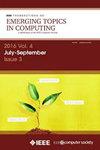永远投票:区块链上的重复投票框架
IF 5.1
2区 计算机科学
Q1 COMPUTER SCIENCE, INFORMATION SYSTEMS
IEEE Transactions on Emerging Topics in Computing
Pub Date : 2023-09-22
DOI:10.1109/TETC.2023.3315748
引用次数: 4
摘要
选举通常在固定的时间间隔后重复进行,间隔时间从数月到数年不等。这就造成了对治理的限制,因为当选的候选人或政策很难在下次选举前(如果需要)被撤换,而且相应的法律也允许这样做。参与者可以(通过公开讨论)决定改变他们的选择,但没有机会在下次选举前对这些选择进行投票。另一个问题是峰末效应,即选民的判断是基于选举前不久的感受。为了解决这些问题,我们提出了 "随时投票"(Always on Voting,AoV)--一种重复投票框架,允许参与者投票并改变当选的候选人或政策,而无需等待下一次选举。参与者可以在任何时间点私下更改投票,而更改的效果会在每个纪元结束时体现出来,每个纪元的持续时间比两次主要选举之间的时间短。为了避免历时峰值效应的问题,历时的结束时间是随机的,不可预测,同时保持在软约束范围内。这些目标是通过比特币谜题甲骨文、可验证延迟函数和智能合约之间的协同作用来实现的。本文章由计算机程序翻译,如有差异,请以英文原文为准。
Always on Voting: A Framework for Repetitive Voting on the Blockchain
Elections repeat commonly after a fixed time interval, ranging from months to years. This results in limitations on governance since elected candidates or policies are difficult to remove before the next elections, if needed, and allowed by the corresponding law. Participants may decide (through a public deliberation) to change their choices but have no opportunity to vote for these choices before the next elections. Another issue is the peak-end effect, where the judgment of voters is based on how they felt a short time before the elections. To address these issues, we propose Always on Voting (AoV) – a repetitive voting framework that allows participants to vote and change elected candidates or policies without waiting for the next elections. Participants are permitted to privately change their vote at any point in time, while the effect of their change is manifested at the end of each epoch, whose duration is shorter than the time between two main elections. To thwart the problem of peak-end effect in epochs, the ends of epochs are randomized and made unpredictable, while preserved within soft bounds. These goals are achieved using the synergy between a Bitcoin puzzle oracle, verifiable delay function, and smart contracts.
求助全文
通过发布文献求助,成功后即可免费获取论文全文。
去求助
来源期刊

IEEE Transactions on Emerging Topics in Computing
Computer Science-Computer Science (miscellaneous)
CiteScore
12.10
自引率
5.10%
发文量
113
期刊介绍:
IEEE Transactions on Emerging Topics in Computing publishes papers on emerging aspects of computer science, computing technology, and computing applications not currently covered by other IEEE Computer Society Transactions. Some examples of emerging topics in computing include: IT for Green, Synthetic and organic computing structures and systems, Advanced analytics, Social/occupational computing, Location-based/client computer systems, Morphic computer design, Electronic game systems, & Health-care IT.
 求助内容:
求助内容: 应助结果提醒方式:
应助结果提醒方式:


